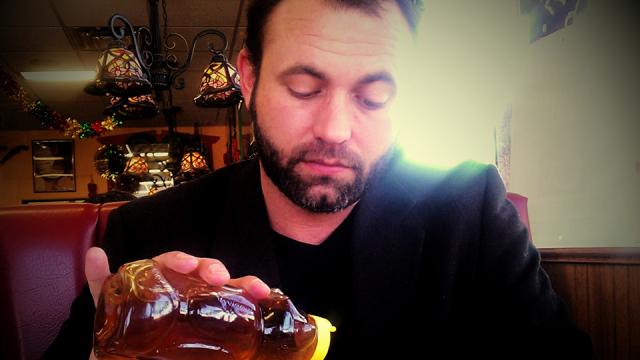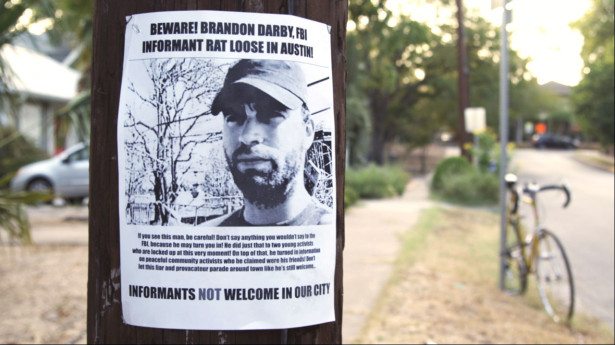
Riad Hamad’s body was found in Lady Bird Lake on April 15, 2008. His hands and feet were bound by duct tape, while another strip covered his eyes. Hamad was a school teacher in Austin, Texas, and a peace activist who supported the Palestine Children’s Welfare Fund — a charity he raised money for by selling handmade Palestinian crafts. His home was raided by the FBI and the IRS just two months earlier. At first the cause of death was a mystery, but later an autopsy revealed that Hamad had committed suicide.
Several months later, David McKay and Bradley Crowder were arrested for allegedly making Molotov cocktails and plotting to use them to bomb parked police cars. The two young men had driven from Austin to Minneapolis a few days earlier with a cohort of young radicals to protest the 2008 Republican National Convention. They were joined by an estimated 10,000 other demonstrators from around the country, who descended on the city. They anticipated repression, bringing homemade shields to protect themselves from police. What they did not expect, though, was that one of their comrades, a celebrated activist, would twist their minds with macho dreams and pressure them to take dangerous actions — only later to betray them to the FBI.
The new documentary Informant investigates the life of the man behind both of these tragedies: Brandon Darby. It chronicles his rise to prominence as a founder of Common Ground, a collective that spearheaded disaster relief in New Orleans following Hurricane Katrina, and charts his descent into infamy with the revelation that he had been working as an FBI informant.
Although the story is a few years old, two recent cases of FBI entrapment, those of the Cleveland 4 and the NATO 3, have made it imperative for radical communities to understand the ways in which the U.S. government is using informants to wage war on dissent. The film opened in New York City on Friday, Sept. 13, at which time it was also made available to watch online via iTunes.
Informant reconstructs Darby’s history of engagement with social justice groups and builds a kind of pathology of power in an effort to account for his transformation from leftist activist to Tea Party educator. The film juxtaposes the perspectives of journalists and former comrades with Darby’s own narrative, a story that it presents in full for the first time. Early on, the film portrays Darby as an ambitious and talented organizer, recounting how he came to New Orleans after Katrina and persuaded FEMA to rescue his friend, Robert “King” Wilkerson, a former Black Panther.
Many of the film’s commentators, including Scott Crow and Malik Rahim, recall this era fondly. One former friend even calls it “Brandon’s glory days.” But the idea that things were ever peachy keen is undermined by the testimony of Caroline Heldman, a Common Ground alum, whose initial impression was that Darby was as an ego-maniac. Heldman is notably the first woman to appear on screen almost 15 minutes into the film and, unlike the other male characters, she unequivocally denounces his behavior.
To fully appreciate the significance of this fact, we must be clear: This is a story about men, their relationships and their struggles for power. Although Brandon Darby is the film’s antagonist for many audiences and former friends, none of the men involved can ultimately go without blame.
The film depicts a series of complicated and highly problematic relationships between Darby and Scott Crow, Darby and his FBI handler, and Darby and David McKay. These are presented against the backdrop of Darby’s troubled youth and his time spent as a runaway, which creates the psychological vantage point that he was searching for a place to belong. In this scheme, Crow is a major influence on Darby, acting both as a personal and political mentor. But after a period of turmoil in which his political beliefs are sharply called into question, Darby distances himself from Crow and turns to the FBI, where he forms a bond with his fatherly handler.
Darby recounts this process in the film when he describes how he turned Hamad over and reacts to learning of the teacher’s suicide, saying, “It was really upsetting, and the thing that was really, really difficult was that I couldn’t talk about it. The only one I could talk to was the guy from the FBI. And I did every day, because I cried. I was upset.”
A short time later, Darby was assigned by the FBI to monitor a group of activists in Austin who were planning to attend the RNC demonstrations. As an older, more experienced activist, he quickly became an important figure for Bradley Crowder and David McKay, similarly disaffected young men.
“I think Brandon and David are fascinating foils for one another,” Jamie Meltzer, the film’s director, told me. “In a way, when Brandon turned in David, he was turning in his earlier self. If things had gone another way, I think that easily could have been Brandon in his early 20s, if he had been involved with an FBI Informant.”
All of this begs the question: Why didn’t anyone intervene when Darby was showing destructive behavior? The film traces a history of his abuses of power. This perspective doesn’t originate with the filmmaker — it comes from Darby’s former friends. At the same time, the film traces a parallel arc: the systematic failure of these communities to react to obvious signs and hold one of their male leaders accountable. Lisa Fithian, a long-time activist close to the story, appeared in the film and spoke to me at length about the role that patriarchy played in allowing Darby’s behavior to go unchecked.
“Throughout this work, there were women who had a different analysis of Darby’s behavior and urged for different options,” she said. “But we were never really taken seriously.”
The macho culture created by activists in different spheres made it impossible to hold Darby accountable for his actions. It may have even given him impunity.
“Brandon could not have continued to do what he did if he was not backed by Malik and [Common Ground],” said Fithian. “And Brandon could not have continued to do what he did around the RNC if he wasn’t backed by Scott. So you have to see there is a repeating pattern where the dominant systems and the people within them are in many ways unconsciously continuing to promote this.”
Female voices are scattered throughout the film, sprinkled occasionally in the spaces between long-winded male storytellers. It is disturbing that women are given so little space. In one instance of thoughtless editing, Fithian briefly appears on screen to tell us, “Then it got much more complicated when they were on the ground down there,” describing a trip that Darby took to Venezuela. Relegating women to the work of creating transitions in a male-dominated film is counter-productive. Nevertheless, that is the way this story has been approached by all who have tried to tell it. The film’s structure in this sense is dubious, but startlingly accurate in the way it mimicks the flaws of the movement.
“The dominant paradigm was male driven,” said Fithian, adding, “and it’s continuing to be the dominant force in the telling of the story.”
Informant is a film that will undoubtedly leave many in the activist community scratching their heads. What is the utility of a movie about an informant that doesn’t provide answers and, if anything, only creates more questions?
Meltzer suggests this is the wrong way to approach the problem.
“In this type of film, the audience wants to know how the filmmaker feels about the subject so they can know how to feel as the viewer,” he said. “That’s not the kind of experience I want to give to my audience.”
The experience that seems to emerge is found in the gaps that the film creates, either by design or by replicating the world that it is representing. In that sense, Informant offers an instructive lesson. Audiences should question the motives of all parties involved, but especially the masculine perspectives that duel with Brandon Darby.
Let’s take this opportunity to leave the informant himself behind. Instead, we need to focus on the real untold story of the film: the patriarchal silencing of women’s voices that leaves communities vulnerable to infiltration. That wasn’t the story the film intended to tell, but that is the story we need to see.
3 WAYS TO SHOW YOUR SUPPORT
- Log in to post comments














